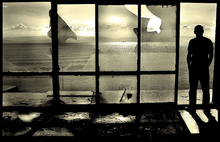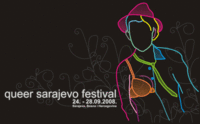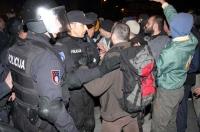
It was a witch hunt, or more exactly, a hunt of the "other". The first queer festival in Sarajevo ended before it had even begun. Fifteen persons were injured or were subject to threats by hooligan gangs and Wahhabi groups. In addition, Iggy Pop cancelled his upcoming concert in Sarajevo
Fifteen persons had been injured and many more threatened in attacks that took place throughout Sarajevo during September 24-29 when the first Queer Sarajevo Festival (QSF) organised by the association "Q" was scheduled to take place . The event was considered high-risk due to strong criticism by the media, political and religious representatives, and the death threats addressed to its organizers and supporters. On the opening night, festival participants were followed and beaten by groups of hooligans and Islamic extremists. Eight festival participants were hospitalised. A Danish citizen and guest of the QSF suffered the most serious injuries with several broken ribs. He was kept under protection during the following days.
The day after what the media called "Sarajevo's Kristalnacht", the association "Q" announced that the festival would continue, but behind closed doors. "We will proceed with the festival until the end of 2008," said organizers Svetlana Djurkovic and Boba Dekic. "Starting today, there will be a queer event every day. Primitives such as those who launched the attacks on September 24 cannot win." Events were to be rescheduled and the gay and gay-supportive communities would be informed by text messages.
Text messages arrived; unfortunately, they announced that there would be no further events. Threats had intensified during the following two days. A YouTube video, which was subsequently removed, played Islamic music during the decapitation of the stylised figure from the Queer Festival poster. Svetlana Djurkovic, president of "Q" was directly threatened.
Having decided, by the following Sunday, to leave Bosnia and Herzegovina for their personal security, Boba Dekic and Svetlana Djurkovic were determined to react and advocate against the climate of fear that for the moment is focused on gay activists, but could be directed against anyone in the future.
The lack of security in the Bosnian capital, and the low respect for human rights affected even the organisers of the Iggy Pop concert scheduled for October 1. They cancelled the concert because of the attacks related to QSF .
"For me, September 24 is a date which changed my view of Sarajevo", says Valentina who has lived in the city for years. "I fear the city a lot more now. I feel like a target because I attended the opening and because I easily look queer. This false tranquillity makes life here much more dangerous for those who do not conform to the 'norm' set by the chauvinists. Today, I also discover a Sarajevo full of a conspiracy of silence. When something so bad happens, a city shows its darker side."
What happened on September 24?
September 24 was the opening of the first Queer Sarajevo Festival, a cultural event organized by the lesbian, gay, bisexual and transgender (LGBT) community in Bosnia and Herzegovina. The festival was preceded by weeks of tension, criticism, and threats, aggravated by its scheduling during Ramadan. Worried by the threats, even Amnesty International called on authorities in Bosnia and Herzegovina to ensure everyone's safety during the festival.
Fanatic posters describing homosexuality as perversion, unnatural behaviour, and a disease that makes people inferior to animals, appeared throughout Sarajevo on the opening day. At five o'clock on that day, "people of good will" were called through the Internet to protest against the Queer Festival on the central square "Alija Izetbegovic". Journalists outnumbered the protesters. The only protesters were hooligans and Wahhabis.
Between 200-300 people attended the Queer Festival opening at eight in the evening at the Academy of Fine Arts. The Academy's grand hall hosted the exhibit Nastrani (Queers) with portraits of the 20 Bosnians who decided to "come out", the participants glowed with victory and relief. However, good spirits lasted only a short time.
Protesters started assembling in front of the Academy, and subsequently shouted insults and threats from the other side of Miljacka river. At the same time, extreme Islamists, the so-called Wahhabis, gathered at the entrance of the Academy and attempted to enter, shouting and swearing. "The police did not allow the Wahhabis into the building, but beyond that, it did not act professionally," says Irfan Redzovic, the curator of the photo exhibit. The police were clearly reluctant and hesitant to protect the persons leaving the venue. A few people, including the writer of this text, were exposed to serious assaults, while leaving the exhibit.
Some of those leaving the exhibit were attacked further away, at a safe distance from the police. Others had been followed in cars and some attacked as far as the outskirts of the city. Director Predrag Kojovic and Emir Imamovic, a reporter, were attacked by a few Wahhabis near the Academy. Haris Cupina, a gay man from Mostar, who had posed for the exhibit with the queer flag wrapped around him, was attacked alongside some of his friends in Hrasno, and ended up in a hospital with a broken nose.
The city had a siege atmosphere. Denis had not attended the QSF; he was in a coffee bar in the city centre. "When we went out, we saw these two groups of young guys dressed with sweatshirts and talking to each other. When they saw us, they turned silent; I took my girlfriend by the hand instinctively and I heard them say, 'Okay, they are not gay.'"
An Italian man was followed and threatened by several Wahhabis in the city centre, a couple of hours after the major attacks.
The following day, numerous civil society organisations and some political parties reacted.
Srdjan Dizdarevic, chair of the Helsinki human rights committee of Bosnia-Herzegovina, spoke of the fascist rhetoric that surrounded the violent incidents of September 24. Dino Mustafic, director of MESS, the major theatre festival in Sarajevo, called upon citizens to raise their voices against those who attacked the freedom of expression. The Liberal Democratic Party (LDS) and the Nasa Stranka (Our Party) of Denis Tanovic firmly defended human rights. The position of the social democrats (SDP) was more vague. International organisations and embassies sent press releases condemning and expressing concern over the events. Unfortunately, the two major Muslim parties, Sulejman Tihic's SDA and Haris Silajdzic's Party for Bosnia and Herzegovina remained silent. They did not want to get involved just days before the important local elections scheduled for October 5.









